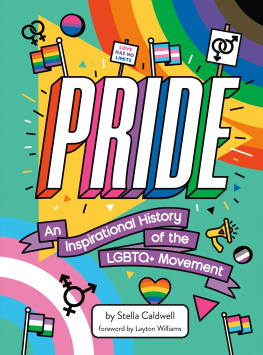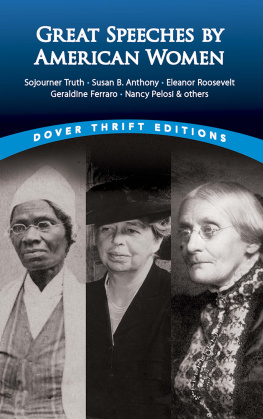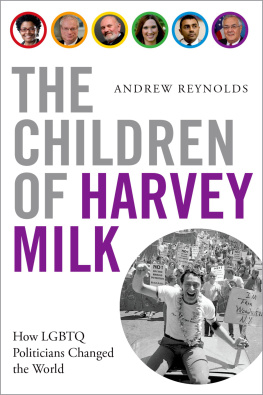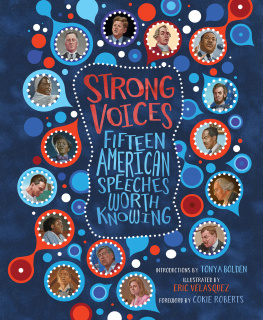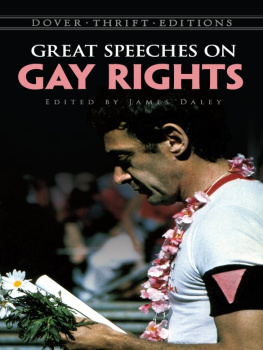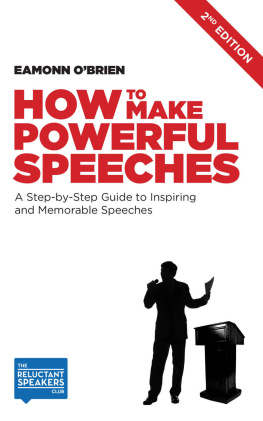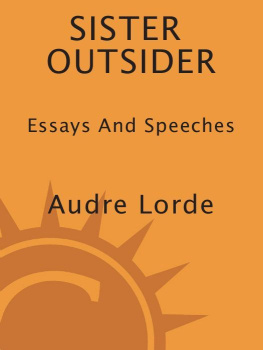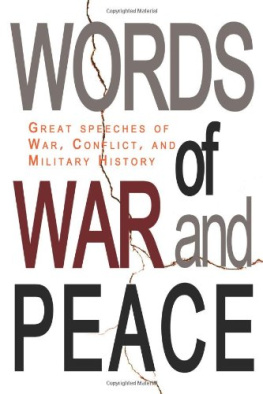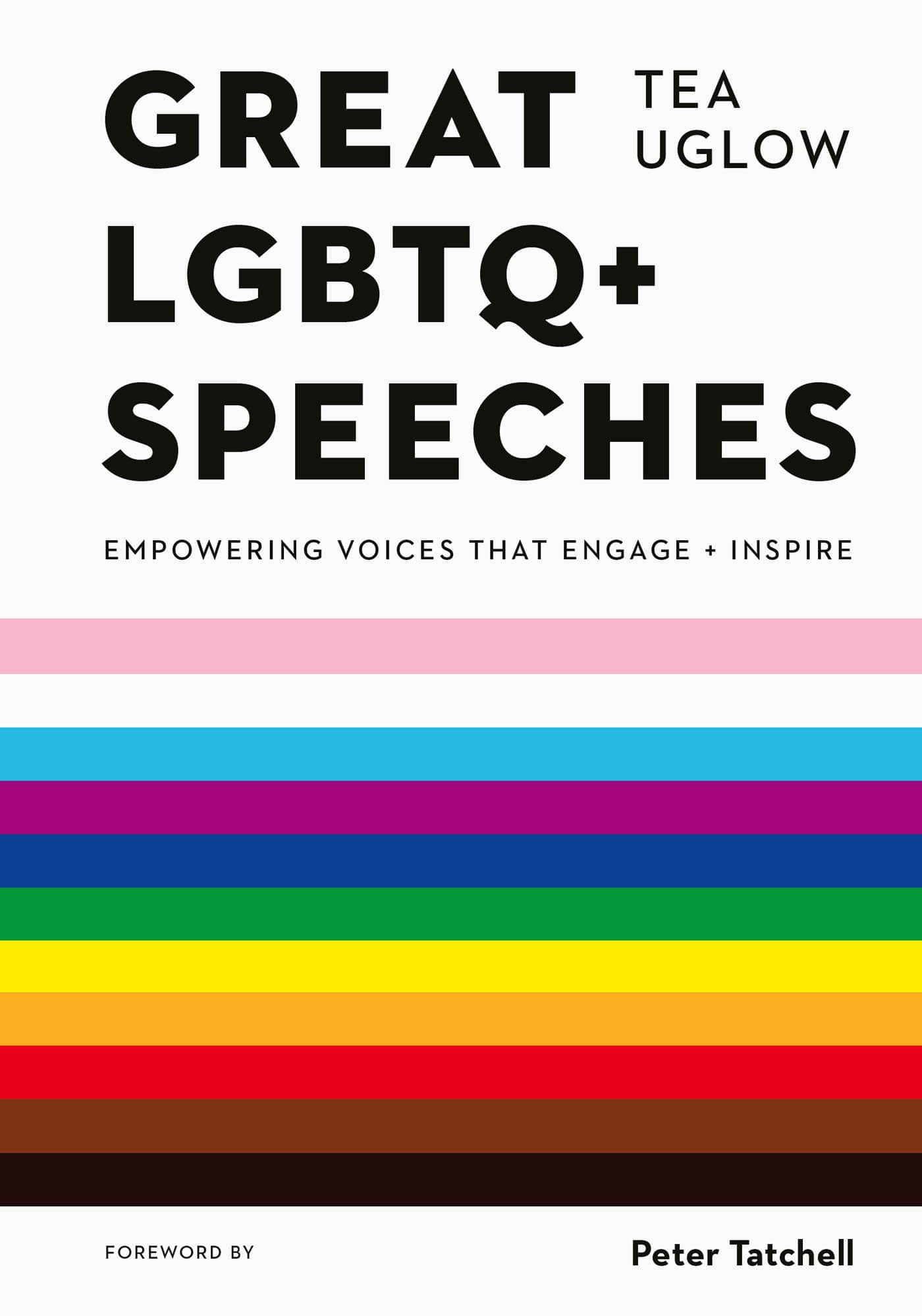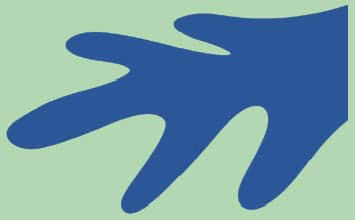Contents
Page List
Guide
Cover
TEA UGLOW
GREAT
LGBTQ+
SPEECHES
EMPOWERING VOICES THAT INSPIRE + EMPOWER
FOREWORD BY Peter Tatchell
CONTENTS
FOREWORD BY PETER TATCHELL
These speeches are the inspiring, pioneering voices of the persecuted, marginalized, ignored and reviled, who refused to remain cowed and silent, often at great personal risk to their reputation, freedom and safety. Their words rang out to shatter the quiet, to make visible the invisible and to advance a just cause. They demanded nothing more than the most basic of human rights: dignity, respect, acceptance and equality for LGBTQ+ people.
Among the speech givers in Great LGBTQ+ Speeches are well-known LGBTQ+ advocates such as Ian McKellen, Sylvia Rivera, Harvey Milk, Audre Lorde, George Takei, Bayard Rustin and Elton John.
But we also hear from little-known champions such as Anna Rling, the German activist who was the first woman in the world to give a political speech in defence of lesbianism, way back in 1904; Simon Nkoli the black, gay anti-apartheid activist, jailed in South Africa in the 1980s; and Anna Grodzka, Polands first transgender MP (201115).
Alongside them are the speeches of straight allies, who stood with LGBTQ+ people in our long quest for liberation, including Barack Obama, Loretta E. Lynch, Hillary Rodham Clinton and Ban Ki-moon.
Many people too often see the LGBTQ+ emancipation struggle as a post-Stonewall 1969 social movement. We are reminded in this book that it actually stretches back over 150 years to trailblazers that include Karl Heinrich Ulrichs who made a ground-breaking appeal for the decriminalization of homosexuality to the Congress of German Jurists in 1867.
Read this book and be inspired and motivated to support the global struggle for queer freedom. Over one-third of the worlds countries still outlaw same-sex relations, and several have the death penalty.
Dont accept the world as it is. Dream of what the world could be and then help make homophobia, biphobia and transphobia history.
INTRODUCTION BY TEA UGLOW
It turns out there is no queer school. Nowhere to learn how to be Lesbian or Gay, or Trans or Queer, let alone Bisexual. No right way to be anything. No one can be too gay, or not gay enough. There are no rules and there is no obligatory queer history. Sometimes that feels like a shame. On the other hand, feminism has spent more than 100 years trying to destroy the how to be a woman school, and we are only just beginning to make inroads with the equally toxic how to be a man school. Yet the absence of a how to be queer canon does leave some rudimentary gaps in ones knowledge. For example, despite starting my queer life very early and arriving very late to my queer self, I never knew that homosexual was originally a German word, nor that the Germans led the way in defining ideas of homosexual human rights in the nineteenth century (see ). The first American gay rights movement was established in 1924 by Henry Gerber, a German. I never knew there were ten years of lesser riots and pickets across the United States prior to Stonewall, and that The Advocate (the American LGBTQ+ magazine) was founded as a result of one of these. This book is the longer story of how we came to this point in our collective identity. It is not a history book, nor is it a collection of inspirational quotes; there is no hierarchy to it, only a loose chronological timeline allowing for thematic clusters including identity and the fight for societal recognition, the AIDS crisis and its associated stigma, gay marriage and transgender rights and visibility. It features the spoken words of queer people and their allies (and, occasionally, their nemeses). Ideally, it will remind us how powerful it is to look an audience in the eye and tell our truth.
I believe in the political act of storytelling as a way of letting folk know that they are not alone. I believe that being visible is the most helpful thing anyone can do for others. It is an old idea, but it is true.
This message has been repeated throughout history, throughout this book from Filipino politicians (see ), camp queens and angry dykes. Repeatedly, the call is to be visible, to be seen and to be heard.
It only occurred to me recently that I was taught to deny and reject my identity. For twenty-five years (between 1988 and 2003) British politicians legislated to make it illegal to teach awareness of LGBTQ+ issues in schools (see ). I was completely blind to the history of queer people. As a geeky queer trans-kid I grew up in a barren silo, fumbling around for an identity. It is ironic that the evergreen clich of LGBTQ+ activists teaching kids to be gay (or trans) is undeniably a fact when seen in reverse: I was taught straight by society. For the vast majority of our speakers in Great LGBTQ+ Speeches, this will have been their battle too. A fight not just with their peers and society, but with the intellectual rejection of their existence and deep-rooted feelings of disgust and self-loathing taught to them through their education. Hopefully this book will reach people with the spoken words of our queer heritage.
I have had an unusual process of coming out in my life. I have identified as a closeted gay man, both kinds of straight, a queer woman, asexual, bisexual and then, finally, as pansexual when that became an option. In other words, having been alive for forty years, I have come to the conclusion that labelling bodies with fixed binaries of sexuality and gender is simplistic. Or at the very least, unwise. It leads to conflict, division, prejudice and othering. Yet in most societites it is the norm. But vocabulary and terminology are forever evolving and spoken words have opened doors and changed lives.
There are words in this book that changed lives forever. Words that, once spoken, opened doors that could never be closed. Words that brought tears and understanding, violence and retribution. The bravery of the speakers featured in this book is immense. Often these speeches were made in front of hostile audiences. Words especially spoken words matter. They change our world, our lives, our sense of self. And they will continue to do so and fight on.
It may feel like a triumphant story in places, like we have finally arrived but we are nowhere near finished. There are maybe just shy of one billion LGBTQ+ people on the planet; in some countries we may get married, self-identify and live a life of privilege with our siblings. In others, that fight is still heard in the courthouses and tabloids on a daily basis. In yet other countries we still face a death penalty for how we are born. It is worth remembering how privilege has given us that liberty, unlike many brave, less fortunate queer people who continue to fight for the right to say life-changing words such as I do or Not Guilty.


